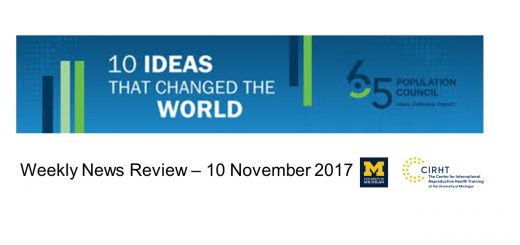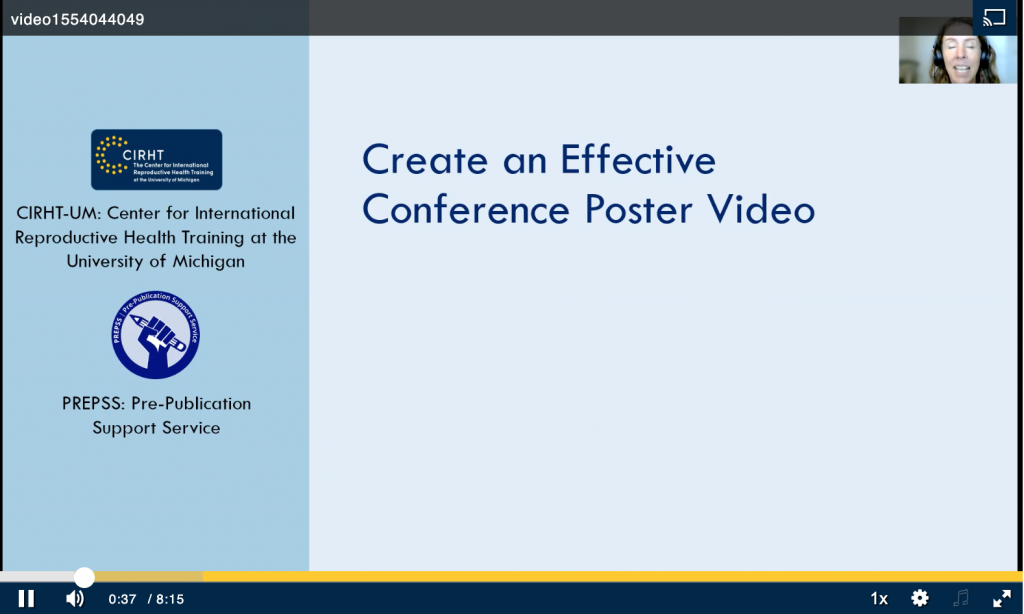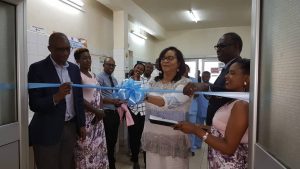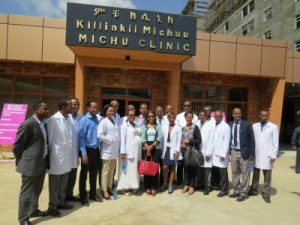News Review – 6 October 2017
Leadership!
Dr. Natalia Kanem was named as the new Executive Director of the United Nations Population Fund (UNFPA). A Panamanian and the first Latin American to take the post, she had served as Acting Executive Director and had been UNFPA Representative in Tanzania. She committed to focus on “ending preventable maternal deaths, ending unintended pregnancies by meeting the demand for family planning, as well as ending gender-based violence and harmful practices, such as child marriage, by 2030.” The appointment was met with praise from family planning advocates and women’s rights groups, who “called on her to take a strong and supportive stance on divisive issues, including abortion, comprehensive sexuality education, and rights for sexual minorities.”
WHO Director-General Tedros Adhanom announced his leadership team, which represents 14 countries, all WHO regions, and is more than 60 percent women, “reflecting my deep-held belief that we need top talent, gender equity, and a geographically diverse set of perspectives to fulfil our mission to keep the world safe.” The team “could change the planet’s approach to health: As has been demonstrated time and again, when women are in leadership positions, they’re bringing a perspective to the table that has previously been missing, and this is particularly important when it comes to public jobs.” (When he was Ethiopia’s health minister, Dr. Tedros launched aggressive programs to reduce maternal mortality, which has resulted in a 30% drop between 2011 and 2016, according to recent Federal Ministry of Health statistics.)
The Rwandan cabinet has approved draft amendments to the nation’s penal code which could make abortion access in certain circumstances easier, removing a provision that requires getting court permission for the procedure. “We struck off the court requirement because it wasn’t helping the victims of such cases,” according to State Minister for Constitutional and Legal Affairs Evode Uwizeyimana.
African rights leaders called for “safe, legal and accessible abortion in the continent.” Michaela Clayton, director of one of the groups, the Aids and Rights Alliance for Southern Africa (ARASA), affirmed, “Laws that criminalise abortion do not prevent women and girls from having abortions, they only make them unsafe.” In Senegal (which has repressive abortion laws – see below), 64 mayors have budgeted for family planning, “important, first-time commitments” and “a strong indicator of growing local ownership for family planning.”
IPPF Africa Region bestowed its first regional awards for SRHR excellence; recipients included Dr. Shimelis Adugna of Ethiopia for Lifetime Achievement, Daniel Oyom of Uganda as Outstanding Youth Volunteer, and Dr. Mustapha Sidiki Kaloko, Commissioner for Social Affairs at Africa Union Commission, “for his great role and contribution in the advancement of SRHR in Africa and beyond.”
EuroNGOs, a coalition of European SRHR organizations, met and “agreed that their best chance of success lies in standing together and maintaining pressure,” including smarter advocacy and not allowing the US to set the agenda. Demonstrators took to the streets in Ireland, Argentina, Belgium, and Poland, where police raided the offices of some women’s groups.
Ariana Campero, the health minister of Bolivia, where unhealthy abortion is the third cause of death, highlighted the approval of Article-153 of the Penal System Code that allows women to have an abortion until eight weeks, with no penalty.
Prof Lesley Regan, the president of the Royal College of Obstetricians and Gynaecologists, called for nurses and midwives to be allowed to give women the pills that end an unwanted pregnancy as part of a relaxation of Britain’s abortion laws. Also in the UK, Diane Munday, 86, who was instrumental in pushing the 1967 Abortion act through Parliament, vowed to “finish the job” and push for liberalization. (A report on the family planning in the UK showed “high rates of unintended pregnancies and sexually transmitted infections as compared to other countries in the European region. A worrying trend is the rise of sexually transmitted infections and unintended pregnancies among adults who are over 40, as the rates of divorce increase.”)
A researcher and a philanthropist in St. Louis, Missouri, had an idea to give nearly 10-thousand women no-cost birth control. From 2007 to 2013 the idea, which became the CHOICE Project, was put into reality. The most recent results, published in New England Journal of Medicine, “found that the CHOICE Project’s teenage participants had significantly lower abortion and birth rates than women nationwide. They use better contraceptives, too: three-quarters of CHOICE Project teens chose LARC methods compared to 4.5 percent of the general population.”
Nurx, an app which provides birth control prescriptions and delivery, is offering free birth control to new users throughout the month of October, to “celebrate the failed ACA repeal.”
Other US advocates stepping up for family planning and reproductive rights include the ACLU and Planned Parenthood, which filed lawsuits in Maine, Hawaii, Arkansas and Iowa. In other cases, federal judges blocked anti-abortion laws in Florida and Kentucky.
Other advocacy efforts of note: A study from the Johns Hopkins Center for Communications Programs shows how targeted advocacy can work: “In Tanzania, pregnant women who were exposed to a national safe motherhood campaign designed to get them to visit health facilities for prenatal care and delivery were more likely to create birth plans and to attend more prenatal appointments.” WGNRR and Ipas Global released a comic strip series about Global Abortion Advocacy Achievement. And watch a fun video about the abortion pill – “Facts You Can Swallow” – from the Lady Parts Justice League.
“Leadership”?
The US House of Representatives passed a bill banning abortion after 20 weeks. Though unlikely to pass the Senate, reaction to the bill was immediate and intense: The bill is “designed to hurt poor women” and “dangerous” and simply “not pro-life”: Among other consequences, “banning abortion procedures after 20 weeks would mean women who find out their unborn child has no survival chances would be forced to carry the pregnancy to term — even if they believe the most compassionate option is to terminate the pregnancy.” To add to the patina of the attack on women, an avowedly anti-abortion congressman was forced to resign when it was discovered he had urged his then-mistress to have the procedure herself. One writer from the Independent Women’s Forum noted, “the truth is that men (even “pro-life” men) benefit from the easy availability of abortion at least as much — if not more — than women.”
Not to be outdone in restricting women’s health options, the Trump administration stripped an Affordable Care Act rule that prevented opt-outs from employers providing contraception insurance coverage. By allowing “your boss to dictate your family planning options”, thousands of women could lose access to free contraception and the need for abortion could increase. Some analysts say the courts will stop the new rules from taking effect, the prospect of which did not stop faith and reproductive justice leaders protesting that “Women deserve affordable access to the health care services they need without interference from their employers and politicians.”
Former Health and Human Services Secretary Tom Price has resigned, but his successor will be just as anti-choice, and will push his efforts to transform Medicaid to undermine reproductive health.
“Leaders” in the US are not alone. In Kenya, the Kisumu County Assembly “rejected a proposal to lower the cost of birth control services arguing it would lead to slow population growth which would be politically disadvantageous.” Vladimir Putin is “targeting Russia’s abortion culture”, as “activists — usually devout members of the influential Russian Orthodox Church — have started seizing on the country’s demographic crisis as an urgent reason for banning the practice.” And British Conservative Party leadership hopeful Jacob Rees-Mogg, who has proclaimed extreme anti-abortion views, admitted that his investment firm “profits from pills used in abortions.”
(For more harrowing reminders of what happens when abortion is illegal, see these articles about Kenya, Senegal and El Salvador.)
Advocacy and Education for Girls
October 9-13 is European Week of Action for Girls, and many outlets examined the importance of family planning communication and access and sex education for young girls and adolescents. It starts with acknowledging that adolescents are sexual beings, as in Ghana where a project “transformed lives… improving the provision, knowledge and awareness of Adolescent Sexual Reproductive Health (ASRH) services and provide capacity to deliver adolescent-friendly SRH services; increasing availability of family planning commodities and strengthening evidence based on factors affecting uptake of ASRH and family planning,” and reaching more than 450-thousand adolescents.
Increased knowledge can come from family conversations, even starting at age 10. A study from Nigeria in the Journal of Public Health in Africa concludes “both the parents and adolescents had good knowledge of adolescent reproductive health, [but] communication on reproductive health issues remains low. Therefore, training intervention to improve the adolescent-parent communication is recommended for the parents.” Another study in Ethiopia showed parents could be a barrier to accessing SRH services: “Awareness and use of youth-friendly services (YFS) was low, but many of the young people who reported using contraception may have been using YFS without knowing it. Importantly, respondents reported low levels of social autonomy and required permission to leave the house from either a parent or spouse, which could present a significant barrier to accessing health services, and especially SRH services.”
It is important to reach young married women, as Knowledge4Health released a toolkit to that end, noting “about one-third of married adolescents in sub-Saharan Africa say that they want to avoid a pregnancy in the next 2 years, but 67% of these are not using any contraceptive method.” The Evidence Project concurs with a study from Ethiopia which recommends, “Target SRH services to married young women and girls at health facilities: Married young women and girls in this study population are largely sexually active, and the vast majority have already experienced a pregnancy. When compared to unmarried girls, married young women and girls are more likely to have used FP, and the majority indicated that they would like to receive FP services from facility-based service providers.”
Sex education in schools also contributes. In Namibia, where pregnancy is high among young students, and another district is addressing the problem of girls not attending because of menstrual hygiene, the Minister of Education, Arts and Culture Katrina Hanse-Himarwa “has proposed compulsory contraceptives for school-going girls in order to prevent escalating teenage pregnancies.” The struggle for sex education continues across the US, where the Trump administration has tripled funding for “abstinence-only” education, and sex educators are regularly censored, in places like Kentucky, where “teens are becoming parents at a rate of 32.4 births per 1,000 girls — much higher than the [US] national rate of 20.3.”
Peer groups can be effective, like those in Uganda, or the two young women from Trinidad and Tobago highlighted by Women Deliver, or the youth ambassadors in West Africa (which has the world’s lowest contraceptive prevalence rate accompanied by the world’s highest fertility rate) or the International Federation of Medical Students Association, or the Miss Rwanda contestant who founded an NGO “that sensitises the youth on sexual reproductive rights.”
Resources aimed at reaching younger girls were released by PSI Impact/A360 Learning, HC3 (“LARCs with younger clients”), and the Independent Accountability Panel.
Technology can help
A Wired article describes a “disturbing rise in cyberattacks against abortion clinics.” But all technology news isn’t bad. Another Wired article announced the arrival of a modern redesign of the speculum. “More comfortable” Intrauterine Balls have been introduced as an option in Kenya. In Nigeria, Slide Safe, a health startup, allows people to order STD test kits and sex products, including condoms and lubricants, discreetly. In Uganda, Ask Without Shame is a hotline for anonymous advice on STDs and other sexual health matters, and Digi Health, a mobile and web solution to support collection and real-time data analysis during health outreach, recently emerged from a competition of 14 entrepreneurs in SRH. One university entrepreneur has successfully installed vending machines on campuses which stock morning-after pills, as well as pregnancy tests, sanitary products, painkillers and anti-histamine.
Complete News Review References:
General/Global
European Week of Action for Girls 2017 (9-13 Oct)
The Trump Administration and Contraception Coverage, The Incidental Economist, 6 Oct 2017
COCA-COLA to Launch ‘Safe Birth Initiative’ for Ivory Coast and Nigeria, This Day, 6 Oct 2017
Trump administration narrows Affordable Care Act’s contraception mandate, Washington Post, 6 Oct 2017
Easy abortion is a winner for sleazy men, New York Post, 6 Oct 2017
Why The Republican Effort To Ban Abortion After 20 Weeks Isn’t Pro-Life, Refinery29, 6 Oct 2017
Center for Reproductive Rights to Fight Back in Court After Trump Administration Guts Women’s Access to Birth Control, Center for Reproductive Rights, 6 Oct 2017
I’m an OB-GYN who had a 2nd-trimester abortion. The 20-week ban bill is dangerous., Vox, 6 Oct 2017
Should Your Boss Dictate Your Family Planning Options? President Trump Thinks So., ACLU, 6 Oct 2017
Contraception rules unfair and may also increase abortions, AL.com, 6 Oct 2017
Faith and Reproductive Justice Voices on the Contraception Mandate, Center for American Progress, 6 Oct 2017
This researcher gave 10,000 women free birth control. Here’s what she found., Vox, 6 Oct 2017
Nurx Is Offering Free Birth Control All Month To Celebrate The Failed ACA Repeal & Here’s How To Get It, Bustle, 5 Oct 2017
This Sex Educator Was Not Allowed to Say ‘Clitoris’ in the Classroom, Tonic, 5 Oct 2017
The speculum finally gets a modern redesign, Wired, 5 Oct 2017
Trump Administration Set to Roll Back Birth Control Mandate, The New York Times, 5 Oct 2017
Here’s how NOT to reduce abortions, Lexington Herald-Leader, 5 Oct 2017
Promote girls’ reproductive rights in order to ensure equitable climate action, Brookings, 5 Oct 2017
New Report Offers Insights on Family Planning and Pregnancy in UK, Digital Journal, 5 Oct 2017
Reproductive Rights Groups File Lawsuit to Expand Access to Abortions, The Free Press, 5 Oct 2017
Police raid offices of women’s groups in Poland after protests, The Guardian, 5 Oct 2017
Make access to abortion easier, UK’s top gynaecologist demands, The Guardian, 5 Oct 2017
Will a vegetarian diet during pregnancy drive your child to drugs and drink?, STAT News, 5 Oct 2017
What women’s lives are like when abortion is a crime, CNN, 5 Oct 2017
A congressman’s unbearable hypocrisy on abortion, CNN, 5 Oct 2017
The disturbing rise of cyberattacks against abortion clinics, Wired, 5 Oct 2017
Young, Married, and Powerful: Supporting First-time Parents and Young Married Women, K4Health, 5 Oct 2017
Efforts to Transform the Nature of Medicaid Could Undermine Access to Reproductive Health Care, Guttmacher, 5 Oct 2017
‘A third of people get major surgery to be born’: why are C-sections routine in the US?, The Guardian, 4 Oct 2017
Should you really be talking to your 10-year-old child about sex?, Bhekisisa, 4 Oct 2017
The World Health Organization’s Leadership Team Could Change The Planet’s Approach To Health, Huffington Post, 4 Oct 2017
Access to medical care for pregnant refugees remains challenge in Greece: NGO, Xinhua, 4 Oct 2017
Family planning sector welcomes Kanem as new UNFPA head, Devex, 4 Oct 2017
A brief history of Planned Parenthood and women’s reproductive health issues, City Paper, 4 Oct 2017
What Planned Parenthood Looked Like in the 1940s, Hyperallergic, 4 Oct 2017
LGBTQ Family Planning: Answers To Some Common Questions, Huffington Post, 3 Oct 2017
Sex Doesn’t Stop During Emergencies, Girls Globe/CARE, 3 Oct 2017
In West Africa, youth ambassadors serve as family planning advocates, Devex, 3 Oct 2017
Lawsuit challenges medically unjustified FDA restrictions that push medication abortion out of reach, ACLU, 3 Oct 2017
LARCs with Young Clients: A Video for Providers, FP2020/HC3, 3 Oct 2017
Poles dressed in black march in defense of women’s rights, Reuters, 3 Oct 2017
Planned Parenthood appeals for stay in court case, Arkansas Times, 3 Oct 2017
Tedros announces WHO senior leadership team, Devex, 3 Oct 2017
House Republicans Just Passed a Bill Banning Abortions After 20 Weeks, Broadly, 3 Oct 2017
Dr. Natalia Kanem Appointed UNFPA Executive Director, UNFPA, 3 Oct 2017
Although Many U.S. Women of Reproductive Age Live Close to an Abortion Clinic, A Substantial Minority Would Need to Travel Far to Access Services, Guttmacher, 3 Oct 2017 (see Academic reference below)
Chart of the Day: What Policy Makers Don’t Know About the Data They Need to Achieve Gender Equality By 2030, UN Dispatch, 3 Oct 2017
Putin’s Next Target Is Russia’s Abortion Culture, Foreign Policy, 3 Oct 2017
‘Don’t let the US set the agenda’: Takeaways from EuroNGOs on reproductive rights, Devex, 2 Oct 2017
Abortion divide: Can you oppose abortion and be a feminist?, USA Today, 2 Oct 2017
Stop Using the Phrase “Late-Term Abortion”, Cosmopolitan, 2 Oct 2017
Judge upholds abortion waiting period, The Courier, 2 Oct 2017
‘I ended a pregnancy before the Abortion Act was passed: here’s what I’m fighting for aged 86’, iNews, 2 Oct 2017
Why we should have morning after pill vending machines on every street corner, The Telegraph, 2 Oct 2017
‘Alarming statistics’ prompt sex education shift in the Falls, Lockport Journal, 2 Oct 2017
The most cost-effective way to save a life depends how you define saving a life, The Hill, 1 Oct 2017
Maajid Nawaz Exposes Jacob Rees-Mogg’s Abortion Hypocrisy, LBC, 1 Oct 2017
Anti-abortion MP Jacob Rees-Mogg makes money from abortion drug, The Sun, 1 Oct 2017
Ohio again had fewer abortions in 2016, continuing steady decline, Dayton Daily News, 1 Oct 2017
Bolivia Approves Arguments to Legalize Abortion, Prensa Latina, 1 Oct 2017
Rural women face ‘alarming’ abortion service gaps, study finds, ABC Australia, 1 Oct 2017
Federal judge blocks Florida abortion law, WEAR TV, 1 Oct 2017
Indiana to Appeal After Obama Judge Strikes Down Law Banning Abortion of Down Syndrome Children, Christian News, 30 Sep 2017
Congress should oppose the 20 week abortion ban, The Hill, 30 Sep 2017
Thousands Rally in Dublin Against Ireland’s Abortion Ban, The New York Times, 30 Sep 2017
Most states have rolled back abortion access for low-income women. This one is expanding it., Vox, 30 Sep 2017
Argentine Protesters Demand Free, Legal and Safe Abortions, TeleSur, 29 Sep 2017
Federal judge strikes down Kentucky abortion law, BR Now, 29 Sep 2017
Tom Price Is Out, But His Replacement Will Be Just as Anti-Choice, Rewire, 29 Sep 2017
Abortion totals down in Ohio as non-surgical abortions increase, new study shows, Cleveland.com, 29 Sep 2017
The 20-week abortion ban is designed to hurt poor women, Harper’s Bazaar, 29 Sep 2017
Your Mom’s Health Insurance Could Help Your Kids, Bloomberg, 29 Sep 2017
Abortion Rights Activists March for Safe and Legal Abortions Across Europe, Democracy Now, 29 Sep 2017
The Abortion Pill: Facts You Can Swallow, Lady Parts Justice League, 28 Sep 2017
Leaders urge access to reproductive health supplies in crisis settings, UNFPA, 28 Sep 2017
WGNRR & Ipas Global release Comic-Strip series of Global Abortion Advocacy Achievements, September28.org, 28 Sep 2017
Why 28 September matters for women’s rights, Action Aid, 28 Sep 2017
IPPF Africa Region Holds First Regional Award for Excellence in Sexual Reproductive Health and Rights, IPPFAR, 26 Sep 2017
What Do Adolescent Girls Think About Contraceptives?, PSI/A360, 26 Sep 2017
We must acknowledge adolescents as sexual beings, BMC, 26 Sep 2017
How Two Young Women are Sharing Contraception Stories in Their Communities, Women Deliver, 25 Sep 2017
The IFMSA approach: improving access to youth-friendly abortion CARE, The Partnership for Maternal, Newborn & Child Health, 20 Sep 2017
Academic
WHO guideline on Syphilis screening and treatment for pregnant women, WHO, 5 Oct 2017
New Report Provides Snapshot of SRMNAH Workforce in East and Southern Africa, MHTF, 4 Oct 2017
Hormonal Contraceptives Improve Women’s Health and Should Continue to Be Covered by Health Insurance Plans, Annals of Internal Medicine, 3 Oct 2017
Disparities and change over time in distance women would need to travel to have an abortion in the USA: a spatial analysis, The Lancet Public Health, 3 Oct 2017
Annual Report 2017 – Transformative accountability for adolescents, Independent Accountability Panel, 2 Oct 2017
Postabortion Contraception: Emerging Opportunities and Barriers, Guttmacher, 2 Oct 2017
Postpartum Hemorrhage – Medications to Treat Uterine Atony, ObG Project, October 2017
Ending unsafe abortions, Financial Times, 29 Sep 2017
Global, regional, and subregional classification of abortions by safety, 2010–14: estimates from a Bayesian hierarchical model, The Lancet, 27 Sep 2017
Quantification of the association between malaria in pregnancy and stillbirth: a systematic review and meta-analysis, The Lancet Global Health, 26 Sep 2017
States That Have Expanded Eligibility for Coverage of Family Planning Services Under Medicaid, Kaiser Family Foundation, September 2017
Benin
La contraception au Bénin: Une infographie, Medium/Partenariat de Ouagadougou, 2 Oct 2017
Botswana
Calls for safe, legal abortion resurface, Midweek Sun, 4 Oct 2017
Cote d’Ivoire
Empowering Women with Choices to Plan Their Futures, Engender Health, 6 Oct 2017
Ethiopia
Understanding Adolescent and Youth Sexual and Reproductive Health-seeking Behaviors in Ethiopia: Implications for Youth Friendly Service Programming, The Evidence Project, 4 Oct 2017
Married Young Women and Girls’ Family Planning and Maternal Heath Preferences and Use in Ethiopia, The Evidence Project, 4 Oct 2017
Ethiopia reduces maternal mortality by over 30 percent – Official, APA News, 1 Oct 2017
Gambia
Family planning services has improved in Kaif-says manager of Kaif health centre, The Point, 4 Oct 2017
Media personnel embarks on field visit, The Point, 2 Oct 2017
Ghana
Project transforms lives of adolescents by addressing their reproductive health needs, Graphic Online, 5 Oct 2017
Male heroes, remedy to low family planning, Ghana Web, 30 Sep 2017
Kenya
Why Kisumu MCAs rejected cheaper birth control, Daily Nation, 5 Oct 2017
More comfortable family planning coil is launched, The Star, 3 Oct 2017
Women still dying from unsafe abortions despite the law, Daily Nation, 1 Oct 2017
Family Planning and Kenya’s Progress Towards the Sustainable Development Goals, PRB, October 2017
Integrating Family Planning Data in Kenya’s DHIS 2, Measure Evaluation, August 2017
Namibia
Proposal for compulsory contraceptives for schools, New Era, 4 Oct 2017
Onambutu school takes on menstrual hygiene, The Namibian, 4 Oct 2017
Pregnancy high among learners in Omusati – Shapange, New Era, 3 Oct 2017
Opuwo to get maternity shelter, New Era, 2 Oct 2017
Nigeria
An on-demand sex health startup is anonymously helping Nigerians have more safe sex, Quartz, 2 Oct 2017
Saving lives of mothers and children through child spacing, Daily Trust, 30 Sep 2017
Knowledge and quality of adolescent reproductive health communication between parents and their adolescents children in Ibadan, Nigeria, Public Health in Africa, 29 Sep 2017
Improve Maternal And Child Health In Edo State, Women & Youth Development Blog, 25 Sep 2017
Rwanda
Government moves to relax anti-abortion law, New Times, 6 Oct 2017
Taking stock of maternity leave benefits scheme, New Times, 5 Oct 2017
Kalimpinya on empowering teens through sex education, New Times, 5 Oct 2017
Gynecology college to offer quality maternal healthcare, New Times, 1 Oct 2017
Senegal
The Price of Senegal’s Strict Anti-Abortion Laws, New Yorker, 1 Oct 2017
Lutte contre les avortements non-sécurisés: Les pays doivent promouvoir une éducation sexuelle complèt, Le Quotidien, 30 Sep 2017
Door Opens to Increase Access to Contraception: First-Time Contributions from 64 Mayors Total $125,000, AFP/FP2020, 29 Sep 2017
Somalia
FGC decision-making dilemmas in Somaliland, Orchid Project, 3 Oct 2017
South Africa
Destigmatizing abortion: starting the conversation, Oppidan Press, 29 Sep 2017
South Sudan
South Sudan’s Mission to Help More Mothers Survive Childbirth, MHTF, 2 Oct 2017
Tanzania
No pain relief, no running water: the perils of childbirth in Tanzania, The Guardian, 2 Oct 2017
Exposure to Safe Motherhood Campaign Associated with More Prenatal Visits, Birth Planning, CCP Study Finds, JHU CCP, 2 Oct 2017
Arumeru women reluctant to practise family planning for fear of being sterile, getting cancer, The Citizen, 2 Oct 2017
Maasai men prefer family planning despite resistance, The Citizen, 30 Sep 2017
Uganda
Digi Health Emerges Winner At Up Accelerate Demo Day, Campus Bee, 5 Oct 2017
Uniting against teenage pregnancies, Daily Monitor, 3 Oct 2017
14 entrepreneurs in sexual reproductive health and what it took to get here!, Medium, 2 Oct 2017
Ask Without Shame, Ask Without Shame, August 2017
Zimbabwe
Waiting rooms bring cheer to Chiweshe women, The Herald, 3 Oct 2017
SADC Parliamentary Women’s Caucus pushes for sexual reproductive health rights’ operationalization, Maravi Post, 2 Oct 2017






